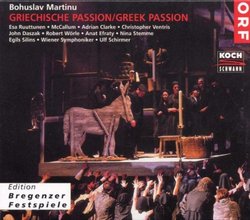| All Artists: Martinu, Ruuttunen, Garrett, Angas, Schirmer Title: Greek Passion Members Wishing: 0 Total Copies: 0 Label: Koch Schwann (Germ.) Original Release Date: 1/1/1999 Re-Release Date: 9/26/2000 Genre: Classical Styles: Opera & Classical Vocal, Historical Periods, Modern, 20th, & 21st Century Number of Discs: 2 SwapaCD Credits: 2 UPC: 099923659020 |
Search - Martinu, Ruuttunen, Garrett :: Greek Passion
 | Martinu, Ruuttunen, Garrett Greek Passion Genre: Classical
|
Larger Image |
CD DetailsSimilar CDs |
CD ReviewsA great opera Tomas Cvrcek | Central, SC, USA | 01/16/2001 (5 out of 5 stars) "The Greek Passion was one of the last pieces that Martinu wrote and it is the only tragic opera that he wrote. Musicologists say that this opera makes more sense when compared with all other Martinu's operas but I think it makes a very good listening on its own, too. Especially the second and third acts are strong, though one should not overlook the wedding in the last act either. Also, the story of the opera is very good - after all, it comes from Nikos Kazantzakis (although the libretto was written on the basis of Kazantzakis's book by Martinu himself). I would certainly recommend this to anyone and what is better, the more you listen to it, the better it gets." Passionate 1st Version of Martinu's Imperfect Last Opera Nicholas A. Deutsch | New York, NY USA | 05/28/2004 (5 out of 5 stars) "Martinu's last opera "The Greek Passion" is a big, rich, powerful work. Set to an English-language libretto adapted by the composer from Nikos Kazantzakis's novel "Christ Recrucified," it depicts the events in a small Greek village following the choice by the religious authorities and town elders of actors for the next year's Eastertide Passion Play, and the profound ways in which their election affects their lives and that of the village. The arrival of a group of desperate refugees acts as a further catalyst to individual and collective spiritual crises. In the event, the religious authorities come off very badly; it is the humble villagers, and particularly the shepherd Manolios (chosen to portray Christ) who struggle sincerely to live Christ's teachings in this world.
Martinu's music is a masterful blend of religious music, folk music and his own individual strong-boned, extremely expressive style, fully responsive to the extemes demanded by the story, whether ecstatic or violent. The score speaks immediately to the listener on first hearing yet is also extremely sophisticated and repays repeated playings. This is a passionate and mysterious opera, not a perfect work but a very rewarding and moving one. The score of "The Greek Passion" exists in 2 extemely different versions, both of them available on CD. The 1st ("London") version [1954-7] is formally bold & unconventional: Martinu uses a wide variety of expressive means, from unaccompanied speech (including a narrator) to large-scale operatic singing with full orchestra, sometimes moving smoothly from one mode to another, sometimes with a deliberate jolt. There is a lot of "realistic" detail and the characters are drawn "in the round"; there's also a very strongly sense of the complex social politics of the situation. Some time after this version was turned down by the Royal Opera House, Covent Garden, Martinu composed a 2nd version [1957-9], nicknamed "Zurich" for the city where it had its premiere in 1961 (in German translation), 2 years after the composer's death. Formally more conventional than "London" (and quite a bit shorter, too), "Zurich" takes the piece much further away from its novelistic origins: while there is still some spoken dialogue, the work is now more of a "drama in music," with more attention to its broader sweep and greatly improved pacing. A lot of realistic detail is suppressed, as well as a few minor characters, and the social critique is downplayed, although the anti-clericalism still registers loud and clear. The central characters, including the all-important 2 choruses, become larger than life, and the entire piece takes on the feel of a huge ritual. What's astonishing is how little of version 1's music Martinu kept for version 2. While some passages were transferred intact, the new version is virtually a new opera. I'm in awe of a composer who could within a relatively short span of time produce what are essentially 2 full-length works on the same subject (and largely the same text) and maintain such a high level of inspiration. Making a choice between the 2 versions is difficult; personally, I find I have developed a preference for this, the original "London" version, quirky & imperfect as it is. Fortunately we now have recordings of both, and both are excellent, committed performances. Supraphon [10 3611-2] chooses the final (2nd) version for its complete 1981 studio recording; Koch Schwann [3-6590-2] opts for the reconstructed 1st version (slightly cut) in a live stage performance from the Bregenzer Festspiele in 1999: the world premiere of the "original," fittingly produced in collaboration with the Royal Opera House, Covent Garden, making amends for its rejection over 40 years earlier. This is "version 1/London," performed with great commitment, if widely varying English-language skills. The role of the young shepherd Yannakos, originally for soprano (a "trousers" role) is taken by a tenor, and, as previously stated, there are a few cuts. But it's an exciting and accomplished performance, with outstanding work from tenor Christopher Ventris (the protagonist Manolios) among others, and strongly led by conductor Ulf Schirmer. Complete English libretto (with German translation); very good notes comparing the 2 versions of the opera. As this set is out-of-print, I suggest grabbing it while you can. Highly recommended. " |

 Track Listings (23) - Disc #1
Track Listings (23) - Disc #1
